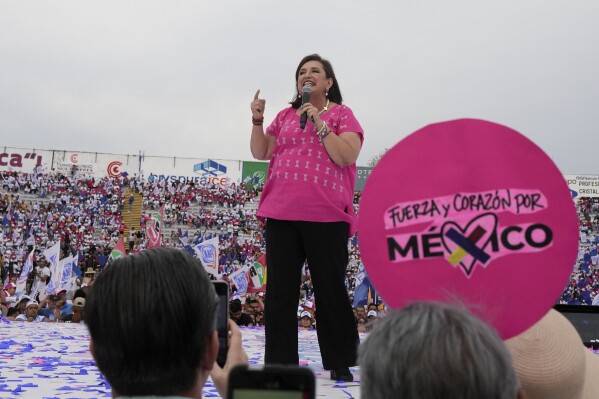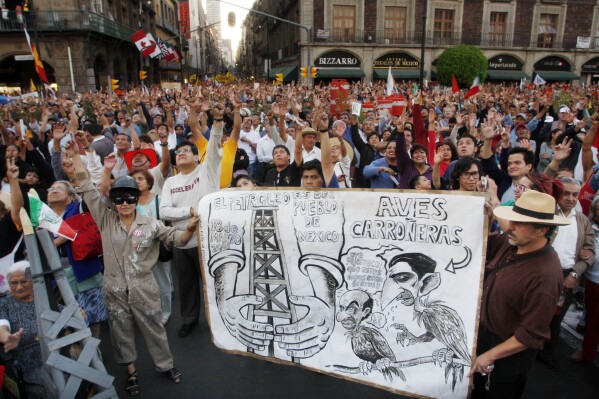Pemex oil workers set the drill on the Centenario deep-water drilling platform in the Gulf of Mexico off the coast of Veracruz, Mexico. The 1938 nationalization of Mexico’s oil sector from U.S. and British companies is a point of pride for millions of Mexicans.
(AP Photo/Dario Lopez-Mills, File)
BY FABIOLA SÁNCHEZ
April 30, 2024
MEXICO CITY (AP) — Mexico’s taking control of its oil sector from U.S. and British companies is taught in schools and celebrated every year. The 1938 nationalization is a point of pride for millions of Mexicans including President Andrés Manuel López Obrador.
The popular president hails from the Mexican oil industry’s heartland, and 16 years ago he led a fight against energy reforms that were aimed at drawing private investment to the massive state-run oil company, Pemex. This year, the front-runner in the race to replace López Obrador chose the anniversary of Mexico’s oil expropriation to announce her energy proposals, which include maintaining large-scale petroleum production by Pemex.

Mexico’s President Andres Manuel Lopez Obrador, right, and Mayor Claudia Sheinbaum, greet supporters at a rally in Mexico City’s main square, the Zocalo, July 1, 2019. Obrador led a fight against energy reforms that were aimed at drawing private investment to the massive state-run oil company, Pemex, and in 2024, the frontrunner in the race to replace him, Sheinbaum, chose the anniversary of Mexico’s oil expropriation to announce her energy proposals. (AP Photo/Fernando Llano, File)
Front-runner Claudia Sheinbaum also wants to make sure that the government-run Federal Electricity Commission, CFE, generates the majority of the power Mexico supplies to homes and businesses. Like the other two candidates to replace López Obrador, she only wants limited private energy involvement, but continuing to favor state-owned companies will make it harder for Mexico to meet its climate change commitments, experts say.
Despite Pemex’s struggles, Mexico continues to be one of the world’s biggest oil producers. None of the candidates are talking about reducing that. The Federal Electricity Commission has held the monopoly on electricity transmission and distribution since it was established by presidential decree in 1937.
Mexico is committed to having 43% of the energy it generates come from non-contaminating sources by 2030. Today about 22% of Mexico’s electricity production comes from clean sources, according to estimates from the Mexican Institute for Competitivity think tank, or IMCO.

A mural of Mexico’s former President Lazaro Cardenas covers a wall alongside the words in Spanish “Pemex is not for sale,” right, from the PRD political party in Mexico City, Friday, Aug. 16, 2013. Cardenas’ oil expropriation was the single most popular decision by a Mexican president in the 20th century, and the nationalization remains immensely popular. (AP Photo/Eduardo Verdugo, File)
The room for change in Mexico’s contribution to global warming appears to be in where the government monopoly gets its electricity and no participant in Mexico’s presidential debate Sunday discussed reducing Pemex production.
Gálvez did say she wants Mexico to produce half its energy from renewable sources within six years and that Mexico once again become known for cheap energy “thanks to private sector participation.”
Sheinbaum mentioned her climate science background and spoke vaguely of a need to reduce the emissions that cause climate change, advancing the energy transition and adapting to climate change. She also said a huge new refinery that López Obrador had built would help reduce Mexico’s gasoline imports.

The Olmeca oil refinery stands at the Dos Bocas port in Paraiso, Tabasco state, Mexico, (AP Photo/Felix Marquez)
Sheinbaum has pledged to continue to increase refining capacity at Pemex, hardly a recipe for a concerted move away from fossil fuels from a climate scientist-turned-politician. The 61-year-old former Mexico City mayor has also said she wants CFE to keep generating the majority of Mexico’s electricity, complicating the country’s stated desire to contribute less to global warming.
López Obrador pushed laws to give CFE plants preference over private renewable and natural-gas generating plants, even though many of the state-owned plants burn dirtier fuels like fuel oil, coal or diesel. The courts blocked the changes, so last year López Obrador bought 13 power plants — most running on natural gas — from Spain’s Iberdrola for nearly $6 billion, calling it the “new nationalization,” ensuring that CFE generates the majority of Mexicans’ electricity
“It would be costly for her to move away from that official line,” said Oscar Ocampo, energy and environment coordinator for IMCO.

Pemex security employees inspect an illegal tap into a state-owned pipeline in a cornfield in San Bartolome Hueyapan, Tepeaca, Mexico,

Presidential candidate Xóchitl Gálvez campaigns in Irapuato, Mexico, March 1, 2024.
“It’s in the DNA of our politics to argue about how much the private part should participate in the sector,” González Romero said
Sheinbaum wants the state-owned energy sector to expand into lithium production and geothermal electricity generation. CFE developed geothermal power generation years ago. In 2022, Mexico nationalized lithium mining and extraction, with a state-run company having exclusive rights to mine the metal used in electric car batteries and other devices.

Supporters of former presidential candidate Manuel Lopez Obrador attend a demonstration organized by Obrador to mark the 70th anniversary of the nationalization of the oil industry in the Zocalo of Mexico City
Gálvez has said she prefers to rely on the private sector to drive renewable energy investments. The tech entrepreneur has also proposed Pemex pivot toward geothermal, but touts a proposal to make it easier for people to install solar panels on their properties across the country to access more affordable electricity.
She also wants to bring back the energy auctions that had opened the electric generation market to more private renewables companies, but which López Obrador suspended.
Climate-related policies went backwards under López Obrador, said Climate Action Tracker, which tracks countries’ pledges to limit warming.

Members of the marine wildlife conservation organization Sea Shepherd monitor the fuel tanker Burgos, as it continues to burn a day after it erupted in flames off the coast of the port city of Boca del Rio, Mexico, Sept. 25, 2016. Mexico is committed to having 43% of the energy it generates come from non-contaminating sources by 2030.
BY FABIOLA SÁNCHEZ
April 30, 2024
MEXICO CITY (AP) — Mexico’s taking control of its oil sector from U.S. and British companies is taught in schools and celebrated every year. The 1938 nationalization is a point of pride for millions of Mexicans including President Andrés Manuel López Obrador.
The popular president hails from the Mexican oil industry’s heartland, and 16 years ago he led a fight against energy reforms that were aimed at drawing private investment to the massive state-run oil company, Pemex. This year, the front-runner in the race to replace López Obrador chose the anniversary of Mexico’s oil expropriation to announce her energy proposals, which include maintaining large-scale petroleum production by Pemex.
Mexico’s President Andres Manuel Lopez Obrador, right, and Mayor Claudia Sheinbaum, greet supporters at a rally in Mexico City’s main square, the Zocalo, July 1, 2019. Obrador led a fight against energy reforms that were aimed at drawing private investment to the massive state-run oil company, Pemex, and in 2024, the frontrunner in the race to replace him, Sheinbaum, chose the anniversary of Mexico’s oil expropriation to announce her energy proposals. (AP Photo/Fernando Llano, File)
Front-runner Claudia Sheinbaum also wants to make sure that the government-run Federal Electricity Commission, CFE, generates the majority of the power Mexico supplies to homes and businesses. Like the other two candidates to replace López Obrador, she only wants limited private energy involvement, but continuing to favor state-owned companies will make it harder for Mexico to meet its climate change commitments, experts say.
Despite Pemex’s struggles, Mexico continues to be one of the world’s biggest oil producers. None of the candidates are talking about reducing that. The Federal Electricity Commission has held the monopoly on electricity transmission and distribution since it was established by presidential decree in 1937.
Mexico is committed to having 43% of the energy it generates come from non-contaminating sources by 2030. Today about 22% of Mexico’s electricity production comes from clean sources, according to estimates from the Mexican Institute for Competitivity think tank, or IMCO.
A mural of Mexico’s former President Lazaro Cardenas covers a wall alongside the words in Spanish “Pemex is not for sale,” right, from the PRD political party in Mexico City, Friday, Aug. 16, 2013. Cardenas’ oil expropriation was the single most popular decision by a Mexican president in the 20th century, and the nationalization remains immensely popular. (AP Photo/Eduardo Verdugo, File)
The room for change in Mexico’s contribution to global warming appears to be in where the government monopoly gets its electricity and no participant in Mexico’s presidential debate Sunday discussed reducing Pemex production.
Gálvez did say she wants Mexico to produce half its energy from renewable sources within six years and that Mexico once again become known for cheap energy “thanks to private sector participation.”
Sheinbaum mentioned her climate science background and spoke vaguely of a need to reduce the emissions that cause climate change, advancing the energy transition and adapting to climate change. She also said a huge new refinery that López Obrador had built would help reduce Mexico’s gasoline imports.
The Olmeca oil refinery stands at the Dos Bocas port in Paraiso, Tabasco state, Mexico, (AP Photo/Felix Marquez)
Sheinbaum has pledged to continue to increase refining capacity at Pemex, hardly a recipe for a concerted move away from fossil fuels from a climate scientist-turned-politician. The 61-year-old former Mexico City mayor has also said she wants CFE to keep generating the majority of Mexico’s electricity, complicating the country’s stated desire to contribute less to global warming.
López Obrador pushed laws to give CFE plants preference over private renewable and natural-gas generating plants, even though many of the state-owned plants burn dirtier fuels like fuel oil, coal or diesel. The courts blocked the changes, so last year López Obrador bought 13 power plants — most running on natural gas — from Spain’s Iberdrola for nearly $6 billion, calling it the “new nationalization,” ensuring that CFE generates the majority of Mexicans’ electricity
“It would be costly for her to move away from that official line,” said Oscar Ocampo, energy and environment coordinator for IMCO.
Pemex security employees inspect an illegal tap into a state-owned pipeline in a cornfield in San Bartolome Hueyapan, Tepeaca, Mexico,
(AP Photo/Eduardo Verdugo, File)
Opposition candidate Xóchitl Gálvez is the candidate for a coalition of ideologically different opposition parties. When she was a senator, she caucused with the conservative National Action Party, which had earlier pushed the energy sector reforms that forced a greater opening to the private sector.
In 2008, leftist lawmakers allied with López Obrador — the PRD’s 2006 presidential candidate — took control of both chambers of congress in an attempt to prevent votes on reforms. Those reforms opened the industry to private contracting in the service sector, but Pemex kept its monopoly over exploration, pipelines and gasoline distribution.
Gálvez has said says she wants to improve Pemex’s efficiency and profit and proposed closing two money-losing refineries. Longshot candidate Jorge Álvarez Máynez of the small Citizen Movement has also proposed closing two refineries.
Opposition candidate Xóchitl Gálvez is the candidate for a coalition of ideologically different opposition parties. When she was a senator, she caucused with the conservative National Action Party, which had earlier pushed the energy sector reforms that forced a greater opening to the private sector.
In 2008, leftist lawmakers allied with López Obrador — the PRD’s 2006 presidential candidate — took control of both chambers of congress in an attempt to prevent votes on reforms. Those reforms opened the industry to private contracting in the service sector, but Pemex kept its monopoly over exploration, pipelines and gasoline distribution.
Gálvez has said says she wants to improve Pemex’s efficiency and profit and proposed closing two money-losing refineries. Longshot candidate Jorge Álvarez Máynez of the small Citizen Movement has also proposed closing two refineries.
Presidential candidate Xóchitl Gálvez campaigns in Irapuato, Mexico, March 1, 2024.
(AP Photo/Fernando Llano, File)
Julia González Romero, a lawyer specializing in energy sector regulations with the law firm González Calvillo, recalled that she was taught in elementary school about the oil expropriation and said it’s understandable that the debate over public versus private in the energy sector is heated.
Julia González Romero, a lawyer specializing in energy sector regulations with the law firm González Calvillo, recalled that she was taught in elementary school about the oil expropriation and said it’s understandable that the debate over public versus private in the energy sector is heated.
“It’s in the DNA of our politics to argue about how much the private part should participate in the sector,” González Romero said
Sheinbaum wants the state-owned energy sector to expand into lithium production and geothermal electricity generation. CFE developed geothermal power generation years ago. In 2022, Mexico nationalized lithium mining and extraction, with a state-run company having exclusive rights to mine the metal used in electric car batteries and other devices.
Supporters of former presidential candidate Manuel Lopez Obrador attend a demonstration organized by Obrador to mark the 70th anniversary of the nationalization of the oil industry in the Zocalo of Mexico City
(AP Photo/Marco Ugarte, File)
She had said she wants an energy transition to be one of the “hallmarks” of her administration and spoken of leaving the door open to private energy companies. But Ocampo said there is “a fundamental difference in the magnitude of (the private sector’s) participation” in the candidates’ proposals.
She had said she wants an energy transition to be one of the “hallmarks” of her administration and spoken of leaving the door open to private energy companies. But Ocampo said there is “a fundamental difference in the magnitude of (the private sector’s) participation” in the candidates’ proposals.
Gálvez has said she prefers to rely on the private sector to drive renewable energy investments. The tech entrepreneur has also proposed Pemex pivot toward geothermal, but touts a proposal to make it easier for people to install solar panels on their properties across the country to access more affordable electricity.
She also wants to bring back the energy auctions that had opened the electric generation market to more private renewables companies, but which López Obrador suspended.
Climate-related policies went backwards under López Obrador, said Climate Action Tracker, which tracks countries’ pledges to limit warming.
Members of the marine wildlife conservation organization Sea Shepherd monitor the fuel tanker Burgos, as it continues to burn a day after it erupted in flames off the coast of the port city of Boca del Rio, Mexico, Sept. 25, 2016. Mexico is committed to having 43% of the energy it generates come from non-contaminating sources by 2030.
AP Photo/Felix Marquez
AP WAS THERE: Mexico’s 1938 seizure of the oil sector from US companies

This image shows the front page of the March 19, 1938, edition of The El Paso Times with an AP story, “Mexico Seizes U.S., British Oil Interests.” Mexico took control of its most precious natural resource by seizing the oil sector from U.S. companies in 1938, in a move that’s taught starting in first grade today and celebrated each year as a great patriotic victory.
INDEMNITIES UNSTATED
No announcement was made as to the amount the companies would be paid as indemnification for their properties. Under Mexican law, such indemnification must be made within years.
Cardenas’ decision was made after a three-hour meeting of the hastily summoned cabinet.
A two-year conflict between the foreign companies and heir workers had apparently reached a stalemate
The 18,000 members of the syndicate, following a decision of the labor board dissolving existing contracts, decided to “suspend operations.”
The bone of contention was a federal arbitration board ruling that the companies should pay higher wages, which the operators said would cost them $12,000,000 a year — more than expected profits — and would force them out of business.
FIRMS OFFERED TO PAY
After the workers’ syndicate announced that the strike would start at midnight tonight the companies, in statements to newspapers, said they had offered to pay the amount (stipulated by the government to equal $7,200,000 annually) stipulated in the award ...
Cardenas was said to have replied: “It is too late now.”
This image shows the front page of the March 19, 1938, edition of The El Paso Times with an AP story, “Mexico Seizes U.S., British Oil Interests.” Mexico took control of its most precious natural resource by seizing the oil sector from U.S. companies in 1938, in a move that’s taught starting in first grade today and celebrated each year as a great patriotic victory.
(The El Paso Times via AP)
April 30, 2024
MEXICO CITY (AP) — EDITOR’S NOTE:
Mexico took control of its most precious natural resource by seizing the oil sector from U.S. companies in a move that’s taught starting in first grade today and celebrated each year as a great patriotic victory.
The woman holding a double-digit lead in the June 2 election to replace President Andrés Manuel López Obrador is an environmental engineer who helped produce the 2007 Nobel Prize-winning Intergovernmental Panel on Climate Change report. Claudia Sheinbaum has also been a faithful protege of López Obrador, who hails from the oil industry’s Gulf of Mexico heartland and led a 2008 fight against energy reform.
The AP is making available its story from March 18, 1938, reporting the expropriation of foreign oil companies.
___
MEXICO SEIZES U.S., BRITISH OIL INTERESTS
President Lazaro Cardenas tonight announced expropriation by the government of foreign oil companies operating in Mexico.
ADVERTISEMENT
The President announced by radio that the government was taking over the properties of the 17 British and American oil companies, representing investments of $400,000,000.
The announcements was made less than two hours before the time set by the Mexican Oil Workers’ Syndicate for a nation-wide “folded arms strike” as the outcome of months of labor dispute.
The President’s office, immediately following Cardenas’ unannounced and unexpected broadcast, said the government would proceed to issue a decree, setting forth the terms for nationalization of the industry and new bases for its operation.
April 30, 2024
MEXICO CITY (AP) — EDITOR’S NOTE:
Mexico took control of its most precious natural resource by seizing the oil sector from U.S. companies in a move that’s taught starting in first grade today and celebrated each year as a great patriotic victory.
The woman holding a double-digit lead in the June 2 election to replace President Andrés Manuel López Obrador is an environmental engineer who helped produce the 2007 Nobel Prize-winning Intergovernmental Panel on Climate Change report. Claudia Sheinbaum has also been a faithful protege of López Obrador, who hails from the oil industry’s Gulf of Mexico heartland and led a 2008 fight against energy reform.
The AP is making available its story from March 18, 1938, reporting the expropriation of foreign oil companies.
___
MEXICO SEIZES U.S., BRITISH OIL INTERESTS
President Lazaro Cardenas tonight announced expropriation by the government of foreign oil companies operating in Mexico.
ADVERTISEMENT
The President announced by radio that the government was taking over the properties of the 17 British and American oil companies, representing investments of $400,000,000.
The announcements was made less than two hours before the time set by the Mexican Oil Workers’ Syndicate for a nation-wide “folded arms strike” as the outcome of months of labor dispute.
The President’s office, immediately following Cardenas’ unannounced and unexpected broadcast, said the government would proceed to issue a decree, setting forth the terms for nationalization of the industry and new bases for its operation.
INDEMNITIES UNSTATED
No announcement was made as to the amount the companies would be paid as indemnification for their properties. Under Mexican law, such indemnification must be made within years.
Cardenas’ decision was made after a three-hour meeting of the hastily summoned cabinet.
A two-year conflict between the foreign companies and heir workers had apparently reached a stalemate
The 18,000 members of the syndicate, following a decision of the labor board dissolving existing contracts, decided to “suspend operations.”
The bone of contention was a federal arbitration board ruling that the companies should pay higher wages, which the operators said would cost them $12,000,000 a year — more than expected profits — and would force them out of business.
FIRMS OFFERED TO PAY
After the workers’ syndicate announced that the strike would start at midnight tonight the companies, in statements to newspapers, said they had offered to pay the amount (stipulated by the government to equal $7,200,000 annually) stipulated in the award ...
Cardenas was said to have replied: “It is too late now.”
No comments:
Post a Comment